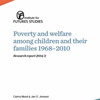1998
Social Mechanisms: An Analytical Approach to Social Theory
1998. Cambridge University Press.
Interaction domains and suicides: A population-based panel study of suicides in the Stockholm metropolitan area, 1991–1999
2009. Social Forces 87(2): 713–740.
The Constant Gap: Parenthood Premiums in Sweden 1968–2010
in: Social ForcesAbstractWe know that parenthood has different consequences for men’s and women’s careers. Still, the research remains inconclusive on the question of whether this is mainly a conseque

Poverty and welfare among children and their families 1968–2010
Research report 2014/2, 78 p. This report studies child poverty, and changes in such poverty both by analyzing the family economy, and directly by using surveys with children themselves. It also compar
The prescription of oral contraceptives and its relation to the incidence of Chlamydia and abortion in Sweden 1997
2012. Scandinavian Journal of Public Health February 40: 85-91.
The effect of number of siblings on adult mortality: Evidence from Swedish registers for cohorts born between 1938 and 1972
Population Studies, Volume 71, Issue 1, doi.org/10.1080/00324728.2016.1260755 Abstract Demographic research has paid much attention to the impact of childhood conditions on adult mortality. We focus on o
Disillusionment and Anti-Americanism in Russia: From Pro-American to Anti-American Attitudes, 1993–2009.
International Studies Quarterly, Volume 62, Issue 3, p.534–547, doi.org/10.1093/isq/sqy013 Abstract In the early 1990s, the Russian public held overwhelmingly favorable attitudes toward the United States
Poverty trends during two recessions and two recoveries: Lessons from Sweden 1991—2013
IZA Journal of European Labor Studies 5:3. DOI 10.1186/s40174-016-0051-8. Abstract We study cross-sectional and long-term poverty in Sweden over a period spanning two recessions, and discuss changes in th

Modern Vikings in the East. Sweden’s Role in 1990’s Russian Economic Reforms: Institutions, Elite Networks, and Informal Practices
What role did Swedish institutions, experts, and elites play in the economic and political development in post-Soviet Russia, with corruption, tax evasion and the emergence of the oligarchy as a result?
Persistent boundaries. Partnership patterns among children of immigrants and natives in Sweden
Journal of Ethnic and Migration Studies Abstract Integration theories assume that ingroup partnering (endogamy) among individuals of immigrant background declines as their exposure to majority society i








